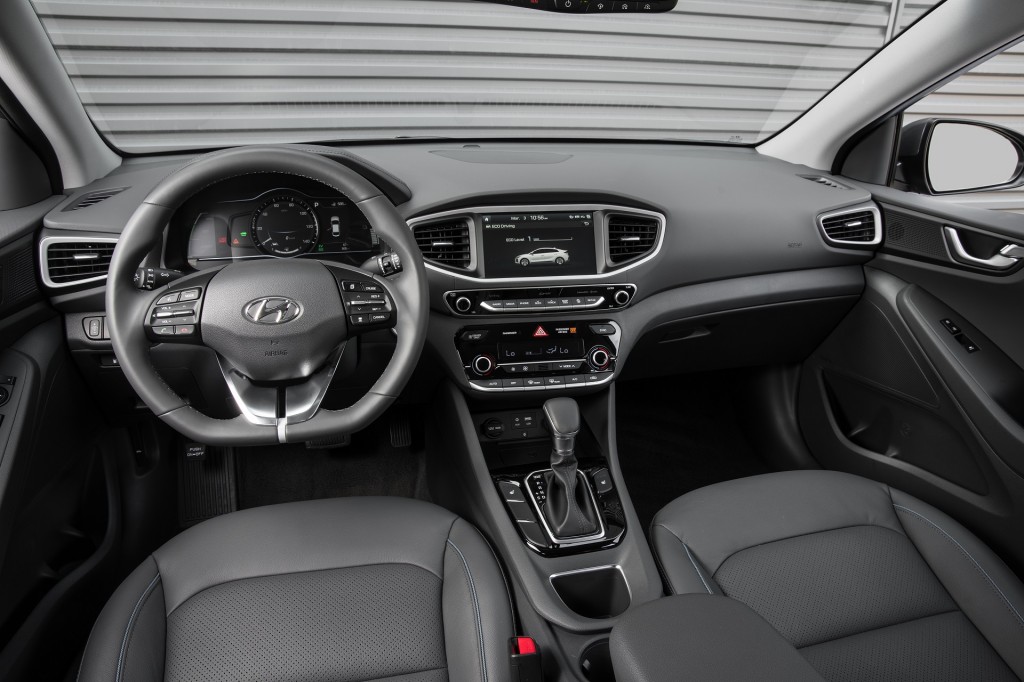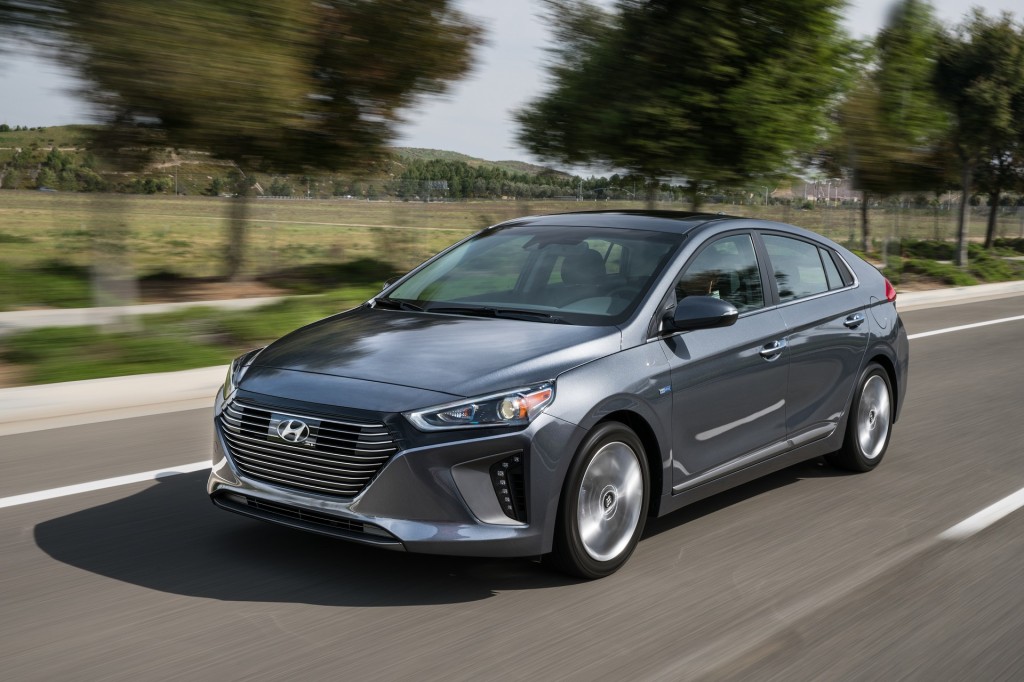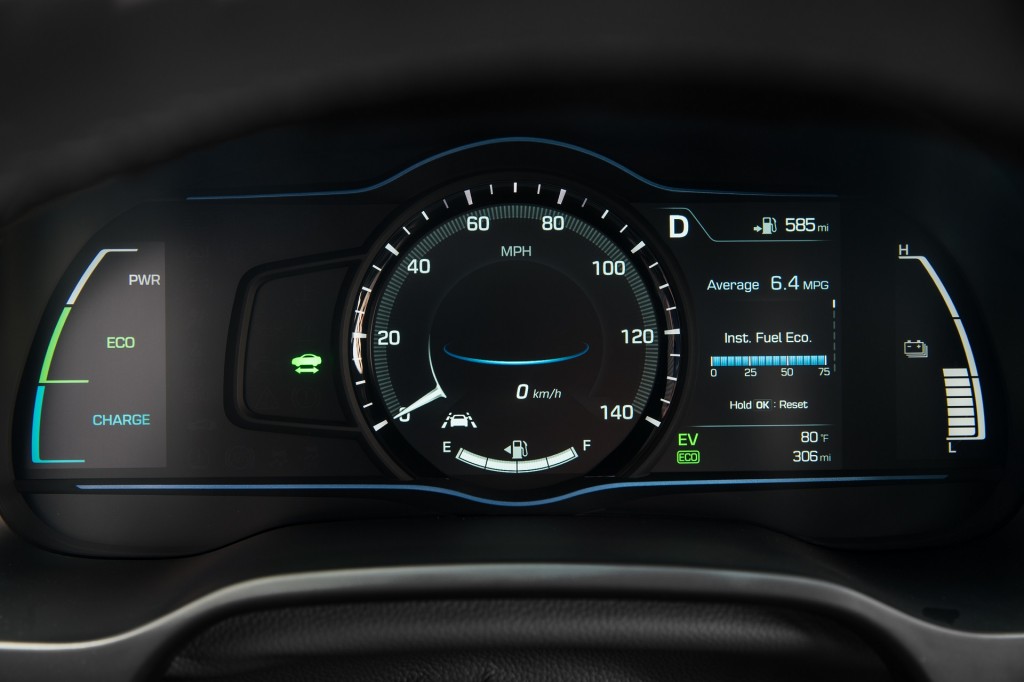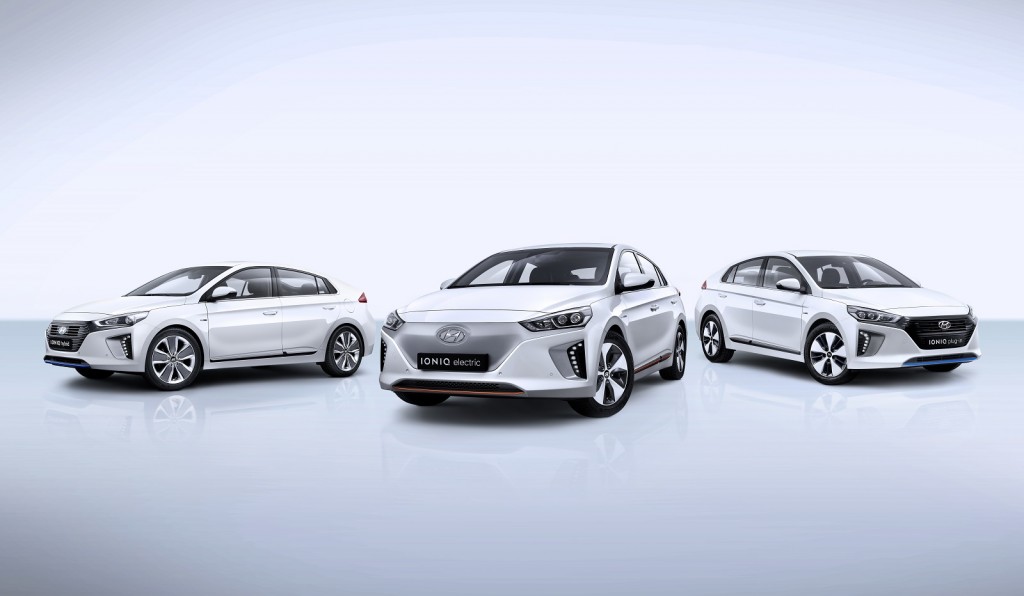The 2017 Hyundai Ioniq isn\’t one car but three, with a unique choice of powertrains.
The volume seller will be the Ioniq Hybrid, a dedicated hybrid (as is the Toyota Prius) with a 58-mpg combined EPA fuel-economy rating for its base model.
But you can also get it as a battery-electric car (starting in April, in California) and late this year, as a plug-in hybrid as well.
DON\’T MISS: 2017 Hyundai Ioniq: full review
We\’ve now driven each of the three Ioniq variants, but we\’ll be reviewing each of the cars separately over the next couple of weeks.
The challenge for the high-volume Hybrid is that for those buyers who can drive it side by side with the Ioniq Electric, the electric car is smoother and quieter.
It\’s also $7,000 pricier and will be distributed in limited states, though Hyundai promises that both the electric and plug-in hybrid Ioniqs can be special-ordered by any dealer.

2017 Hyundai Ioniq Hybrid, Ioniq Electric, and Ioniq Plug-In
Last week we spent roughly 150 miles in the hills outside Santa Barbara, California, splitting our time among a prototype Plug-In hybrid, then the production Hybrid, and finally an Electric for the post-lunch trip back to base.
We didn\’t get enough time in any of them to get useful efficiency ratings; that will wait until we can spend a longer time with each one.
But the Ioniq Hybrid differs in lots of ways from the Toyota Prius against which it\’s primarily aimed.
READ THIS: 2017 Hyundai Ioniq prices: hybrid starts at $23,035, electric at $30,335
The Hyundai is roughly the size of its Elantra compact sedan and hatchback, but with a far more aerodynamic shape that nonetheless neatly camouflages its high, stubby tail.
One of the design goals for the Ioniq was to make it \”normal\” looking, and we suspect it\’ll vanish entirely into traffic as just another small car.
The inside has Hyundai\’s usual straightforward, intuitive layout and controls, and could have been lifted wholesale from the Elantra (though it\’s actually differs in most regards).

2017 Hyundai Ioniq Hybrid
Front-seat riders sit low in the Ioniq, as they do in the latest Prius, at the same height as in the Elantra.
The cabin has lots of passenger volume, but much of it goes to width, as rear-seat headroom is tight and taller adults will be actively hunched over and uncomfortable in the rear.
Behind the wheel, experienced hybrid drivers will notice that Hyundai\’s made the Ioniq Hybrid just about as simple as it can be.
CHECK OUT: 2017 Hyundai Elantra Eco gas mileage road-trip report
There\’s no \”EV\” switch to default the car into electric-only mode for short distances at low speeds, though there\’s a Sport mode that keeps the engine on all the time and changes the shift points to give it peppier acceleration.
Shift points, you say?
Yep. The two Ioniqs fitted with engines use a single electric motor sandwiched between the highly-efficient 1.6-liter 4-cylinder gasoline powerplant and a 6-speed dual-clutch transmission.

2017 Hyundai Ioniq Hybrid
The DCT shifts automatically but has the direct-drive efficiency of a manual gearbox, with its fast shifts buffered by the electric motor—a neat solution.
Hyundai suggests that along with styling \”that isn\’t weird,\” the transmission shifting gives the Ioniq Hybrid a more normal driving feel.
It also has a more sophisticated rear suspension design using trailing arms, which gives it better roadholding and a slightly sportier feel from behind the wheel.
The company\’s done an excellent job with the Ioniq\’s brakes; the blending of regenerative and friction brakes is superb, with transitions all but undetectable.
That\’s a huge improvement over its first-generation 2011 Sonata Hybrid, whose transitions were apparent, inconsistent, and sometimes actively unpleasant. Well done.

2017 Hyundai Ioniq Hybrid
While we experimented with trying to accelerate in electric-only mode, the motor\’s 32 kilowatts (45 horsepower) often wasn\’t enough to keep up with traffic above about 10 mph.
But the car flipped back into electric mode under light loads at speeds as high as 65 mph, so in the end we simply let the powertrain decide for itself and just drove the car.
That\’s what we suspect most buyers will do, in the end.
ALSO SEE: 2016 Toyota Prius: First Drive Of 56-MPG Hybrid (Nov 2015)
Unlike the Prius, which regularly reminds you of its unique design, powertrain, and driving characteristics, the Hyundai Ioniq Hybrid is a car in which you can mostly forget it\’s a hybrid altogether.
That was essentially a design goal, and Hyundai\’s succeeded in that respect.
The question that remains is whether the $2,000 price premium for base Ioniq Hybrid Blue over a base Elantra (or the highest fuel-efficiency Elantra Eco model) is justified in this day and age of cheap gasoline and light-truck purchases.

2017 Hyundai Ioniq Hybrid
And the cost to move up to the next trim level, Ioniq Hybrid SEL, is a further $1,750, taking it close to the $25,500 level of the entry Prius Liftback (and considerably higher than the aging subcompact Prius C hatchback).
Other competitors for the Ioniq Hybrid are the Ford C-Max and perhaps hybrid versions of mid-size sedans that include the Chevrolet Malibu, Ford Fusion, Honda Accord, Hyundai Sonata, and Kia Optima. All come in at higher starting prices.
Our test car was the top 2017 Ioniq Hybrid Limited trim, starting at $27,500.
It carried the Ultimate package, at $3,000, consisting of several active-safety features—adaptive cruise control, lane-departure warning, automatic emergency braking, rear parking sensors, and swiveling headlights—plus memory for the driver\’s seat, a navigation system with 8-inch color touchscreen display, an eight-speaker Infinity premium audio system, wireless device charging, and rear vents.
It also included $125 floor mats, plus the mandatory $835 handling and delivery fee, for a bottom-line sticker total of $31,460.
_______________________________________
Follow GreenCarReports on Facebook and Twitter.

